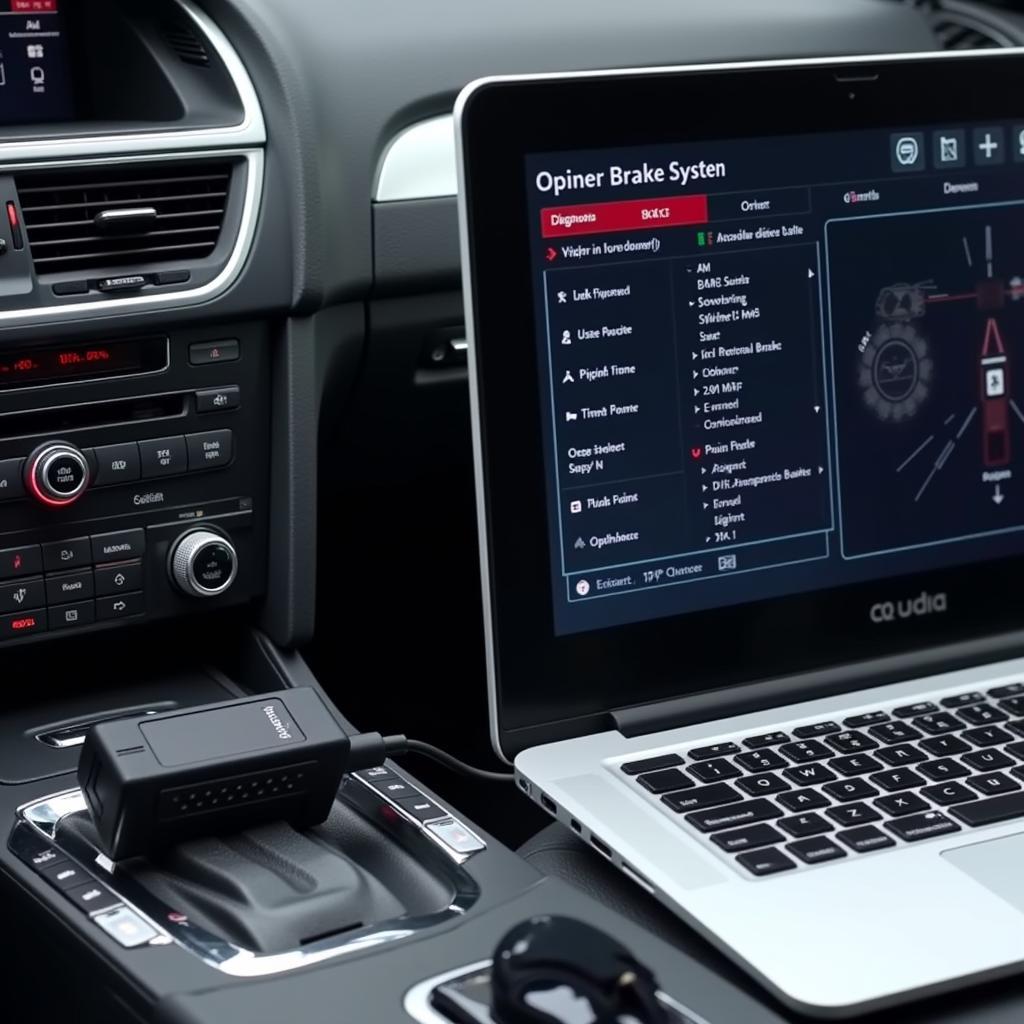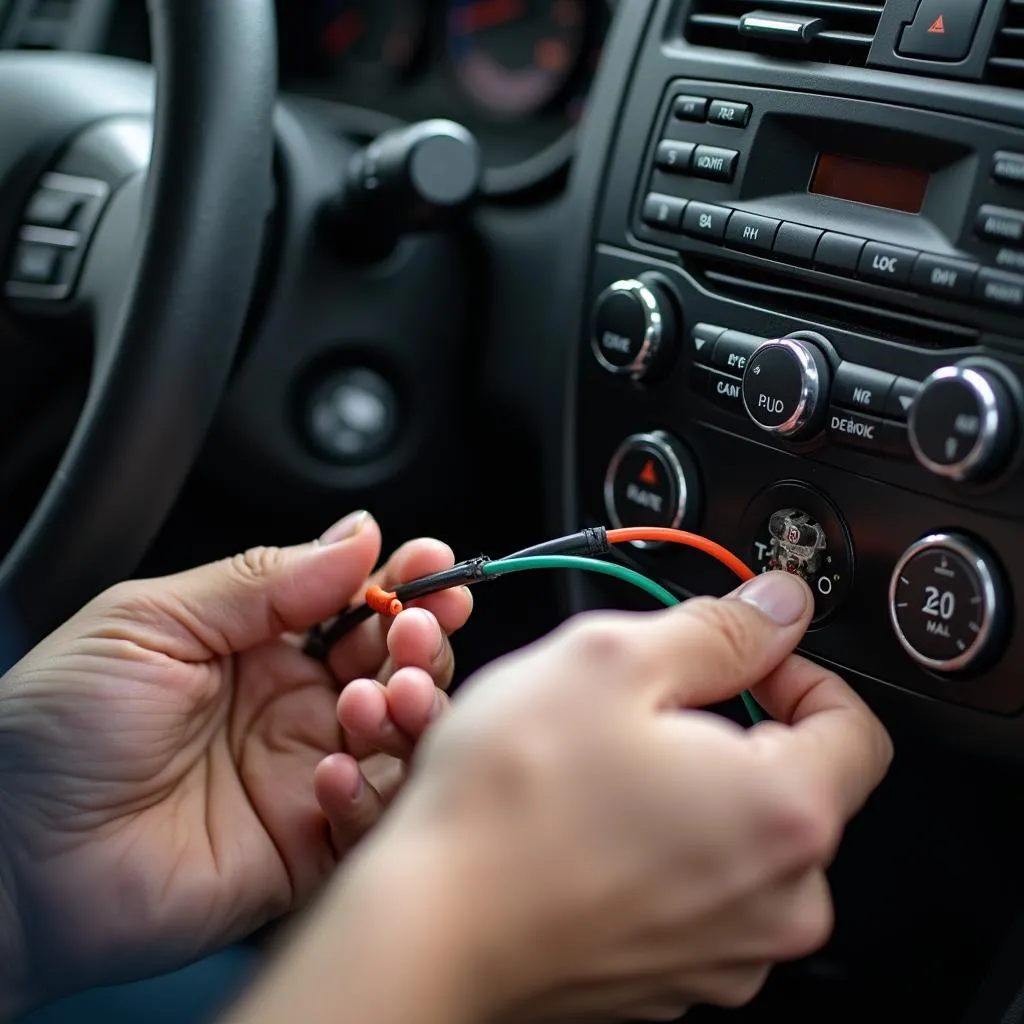The brake pad warning light on your 2012 Audi Q5 is an essential safety feature, designed to alert you when your brake pads are wearing thin and require replacement. Ignoring this warning light can lead to reduced braking performance and potentially dangerous driving conditions. This comprehensive guide will delve into the common causes, troubleshooting steps, and solutions for addressing the brake pad warning light on your Audi Q5.
Understanding Your Audi Q5 Brake Pad Warning Light
When your brake pad wear sensor detects that the brake pads have reached a minimum thickness, it triggers the brake pad warning light on your dashboard. The light typically illuminates as a yellow or red circle with an exclamation mark surrounded by parentheses and the word “BRAKE.” This visual cue serves as a crucial reminder to inspect and replace your brake pads as soon as possible.
Common Causes of a 2012 Audi Q5 Brake Pad Warning Light
While worn brake pads are the most common culprit behind the warning light, several other factors could be at play:
- Worn Brake Pad Sensors: The brake pad wear sensors themselves can become damaged or worn out over time, triggering a false warning light even if the brake pads are still in good condition.
- Damaged Brake Pad Wiring: Frayed or broken wires connecting the brake pad sensors to the vehicle’s electrical system can disrupt the signal, causing the warning light to illuminate.
- Faulty Brake Light Switch: In some cases, a malfunctioning brake light switch can interfere with the brake pad warning light system.
- Low Brake Fluid Level: While not directly related to the brake pads, a low brake fluid level can trigger multiple warning lights, including the brake pad warning light.
Troubleshooting the Brake Pad Warning Light
Before heading to the mechanic, you can perform some basic troubleshooting steps to identify the root cause of the warning light:
- Visually Inspect the Brake Pads: Carefully examine the brake pads through the wheel spokes. Look for significant wear or if the pad material is close to the metal backing plate.
- Check the Brake Fluid Level: Locate the brake fluid reservoir under the hood and ensure the fluid level falls within the minimum and maximum markings on the reservoir.
- Inspect the Brake Pad Sensor Wires: Trace the wires from the brake pad sensors to where they connect to the vehicle’s wiring harness. Look for any signs of damage, fraying, or disconnections.
Solutions for Addressing the Brake Pad Warning Light
Depending on the cause, resolving the brake pad warning light may involve:
- Brake Pad Replacement: If your inspection reveals worn brake pads, it’s essential to have them replaced promptly by a qualified mechanic.
- Brake Pad Sensor Replacement: If you determine that the brake pad sensors are damaged or worn, they will need to be replaced.
- Repair or Replace Damaged Wiring: Any damaged or frayed brake pad sensor wires should be repaired or replaced to restore proper functionality.
- Brake Light Switch Replacement: If you suspect a faulty brake light switch, have it inspected and replaced if necessary.
- Address Low Brake Fluid: If the brake fluid level is low, add the appropriate DOT-rated brake fluid to the reservoir. If the level remains consistently low, consult a mechanic to check for potential leaks in the brake system.
Remote Diagnostics and Software Solutions
In some instances, remote diagnostics and software solutions can help diagnose and even resolve brake pad warning light issues. Using specialized equipment and software, trained technicians can remotely access your Audi Q5’s onboard computer system to:
- Read and Clear Fault Codes: This process helps identify the specific trouble codes triggering the warning light, providing valuable insights into the underlying cause.
- Perform Software Updates: Occasionally, software glitches or outdated software versions can cause warning light malfunctions. Remote software updates can often rectify these issues.
- Conduct Electronic Component Testing: Remote diagnostics enable technicians to test various electronic components within the braking system, such as sensors and modules, to identify any malfunctions.
 Audi Q5 Remote Diagnostics
Audi Q5 Remote Diagnostics
However, it’s crucial to remember that remote diagnostics and software solutions have limitations. While they can provide valuable information and potentially resolve some issues, they cannot physically repair or replace worn components like brake pads, sensors, or wiring.
Expert Insight
“Ignoring a brake pad warning light can have serious consequences for your safety and the longevity of your Audi Q5’s braking system,” says Mark Stevenson, a certified Audi Master Technician with over 20 years of experience. “Timely inspection and maintenance, including regular brake pad replacement and addressing any warning light issues promptly, are crucial for ensuring optimal braking performance and preventing costly repairs down the road.”
Conclusion
The brake pad warning light on your 2012 Audi Q5 is a critical safety feature that should never be ignored. By understanding its causes, performing basic troubleshooting, and seeking timely professional assistance when necessary, you can ensure the safety and reliability of your vehicle’s braking system. Remember, proactive maintenance is key to maximizing your safety and enjoying a smooth, worry-free driving experience.
FAQs
Q: How long can I drive with the brake pad warning light on?
A: It’s not recommended to drive with the brake pad warning light on. Continued driving with worn brake pads can lead to reduced braking performance and potentially damage other brake components.
Q: Can I replace my Audi Q5 brake pads myself?
A: While it’s possible to replace brake pads yourself, it’s generally recommended to have this service performed by a qualified mechanic to ensure proper installation and safety.
Q: How much does it cost to replace brake pads on a 2012 Audi Q5?
A: The cost of brake pad replacement can vary depending on factors like location, labor rates, and the type of brake pads used.
Q: How often should I replace my Audi Q5’s brake pads?
A: Brake pad lifespan can vary widely depending on driving habits and conditions. As a general guideline, it’s recommended to have your brake pads inspected every 10,000 miles and replaced when they reach a minimum thickness.

